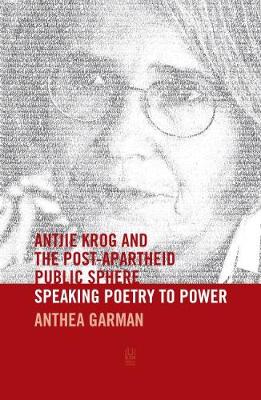
Antjie Krog and the Post-Apartheid public sphere: Speaking poetry to power
Original price
R 379.99
-
Original price
R 379.99
Original price
R 379.99
R 379.99
R 379.99
-
R 379.99
Current price
R 379.99
Antjie Krog has been known in Afrikaans literary circles and media for decades for her poetry and her strong political convictions. Often known simply as `Antjie', she is also affectionately called `our beloved poet' and our `Joan of Arc' by Afrikaans commentators.
It was through her work on the Truth and Reconciliation Commission as an SABC radio journalist and her subsequent book, Country of My Skull, that she then became known to English-speakers in South Africa and across the world. This work catapulted her particular brand of poetics and politics, honed over many years of her opposition to apartheid, into the South African public sphere at a time when the country was not only looking for a humane and just resolution after the apartheid era but was also establishing itself as a new democracy.
These were heady days as South Africa discovered an exciting place in the world, as it realised it had things to say and teach about race, conflict and justice. It was also a time when the new government was seeking solutions and urging all those who could contribute positively to stand up and speak out. The language of `public intellectuals' was in the air.
In this book, Anthea Garman considers how Krog, the prolific poet, journalist, non-fiction book author in English and now also academic and researcher, has made a significant contribution to the South African post-apartheid public sphere. Krog's inimitable style, rooted in her sensibility as a poet, has allowed her to develop a particular persona and subjectivity as a writer of testimony and witness.
It was through her work on the Truth and Reconciliation Commission as an SABC radio journalist and her subsequent book, Country of My Skull, that she then became known to English-speakers in South Africa and across the world. This work catapulted her particular brand of poetics and politics, honed over many years of her opposition to apartheid, into the South African public sphere at a time when the country was not only looking for a humane and just resolution after the apartheid era but was also establishing itself as a new democracy.
These were heady days as South Africa discovered an exciting place in the world, as it realised it had things to say and teach about race, conflict and justice. It was also a time when the new government was seeking solutions and urging all those who could contribute positively to stand up and speak out. The language of `public intellectuals' was in the air.
In this book, Anthea Garman considers how Krog, the prolific poet, journalist, non-fiction book author in English and now also academic and researcher, has made a significant contribution to the South African post-apartheid public sphere. Krog's inimitable style, rooted in her sensibility as a poet, has allowed her to develop a particular persona and subjectivity as a writer of testimony and witness.
